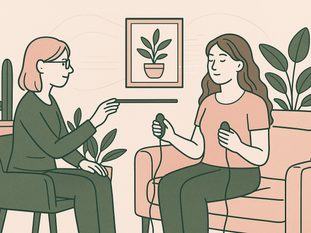265 N Main St. Spanish Fork, UT, 84660
Accepting patients for my waitlist in Utah and Idaho

What the Heck is Scrupulosity?
In a world where mental health awareness is becoming increasingly prominent, some conditions still remain misunderstood or underrepresented. One such condition is scrupulosity, a specific form of obsessive-compulsive disorder (OCD) that revolves around excessive guilt, anxiety, and religious or moral doubts. Many people who have it don't even know what it is. One friend shared with me that she got her diagnosis when her therapist asked what was making her so anxious and she replied, on the bring of tears "I'm anxious because I'm going to hell!"
What is Scrupulosity?
Scrupulosity is a type of OCD that primarily involves intrusive thoughts and compulsions related to religious or moral issues. It can cause an individual to excessively worry about their perceived moral or religious failings, often leading to compulsive behaviors aimed at preventing or mitigating these fears.
For instance, a person with scrupulosity might obsessively check their actions to ensure they haven’t sinned or violated their moral code. They may feel an overwhelming need to confess or seek reassurance from others, even when they haven’t done anything wrong. Several clients I've treated reported they would often check with friends to make sure they hadn't committed crimes without noticing. Scrupulosity makes you feel like you can't trust your brain or actions
The clients I work with are primarily people with ties to the Mormon/Latter-day Saint Church living in Utah County. Their religious beliefs involve abstaining from sex before marriage and not drinking alcohol. Some of these Utah residents have reported symptoms like being unable to order drinks from restaurants in case it was actually alcohol or feeling guilt touching someone of the opposite gender.
Symptoms of Scrupulosity
Symptoms of scrupulosity can vary, but they generally include:
Intrusive Thoughts: Persistent and unwanted thoughts related to moral or religious issues. For example, fears of blasphemy, sins, or offending a higher power.
Compulsive Behaviors: Actions performed to alleviate anxiety, such as excessive praying, confessing, or seeking reassurance from religious leaders.
Avoidance: Avoiding situations or activities that might trigger intrusive thoughts or guilt. This is a compulsive behavior itself.
Severe Anxiety: Experiencing high levels of anxiety or distress due to perceived moral or religious failings.
Guilt and Shame: Intense feelings of guilt or shame, even for minor or imagined infractions. The best name for scrupulosity is probably "Guilt OCD"
Causes of Scrupulosity
The exact causes of scrupulosity are not fully understood, but there is a definite neurobiological and genetic element to the disorder. I personally, choose to see scrupulosity also as a trauma disorder. OCD has an underlying biological cause but it feeds on our life experiences. While some events might not be traumatic to most, they could have long lasting effects on a person with OCD. Many of my patients shared that hearing a story about someone who read their scriptures for 30 min every day caused them to feel that if they didn't do the same they would likely not go to heaven. They read desperately, without enjoyment, everyday. While the story had been sweet and uplifting, their OCD made it traumatic and fed off it for years to come.

Conclusion
Scrupulosity is a challenging and often misunderstood condition that involves severe anxiety and compulsions related to moral or religious issues. It feeds of guilt, and makes its victims feel constant shame. If you're a resident of Mapleton, Springville, or any other Utah City and you deal with religious OCD reach out to us at Peaceful River Counseling and let's talk about how you can get through your symptoms.
Disclaimer: This blog post is intended for informational purposes only and does not constitute medical or psychological advice.








